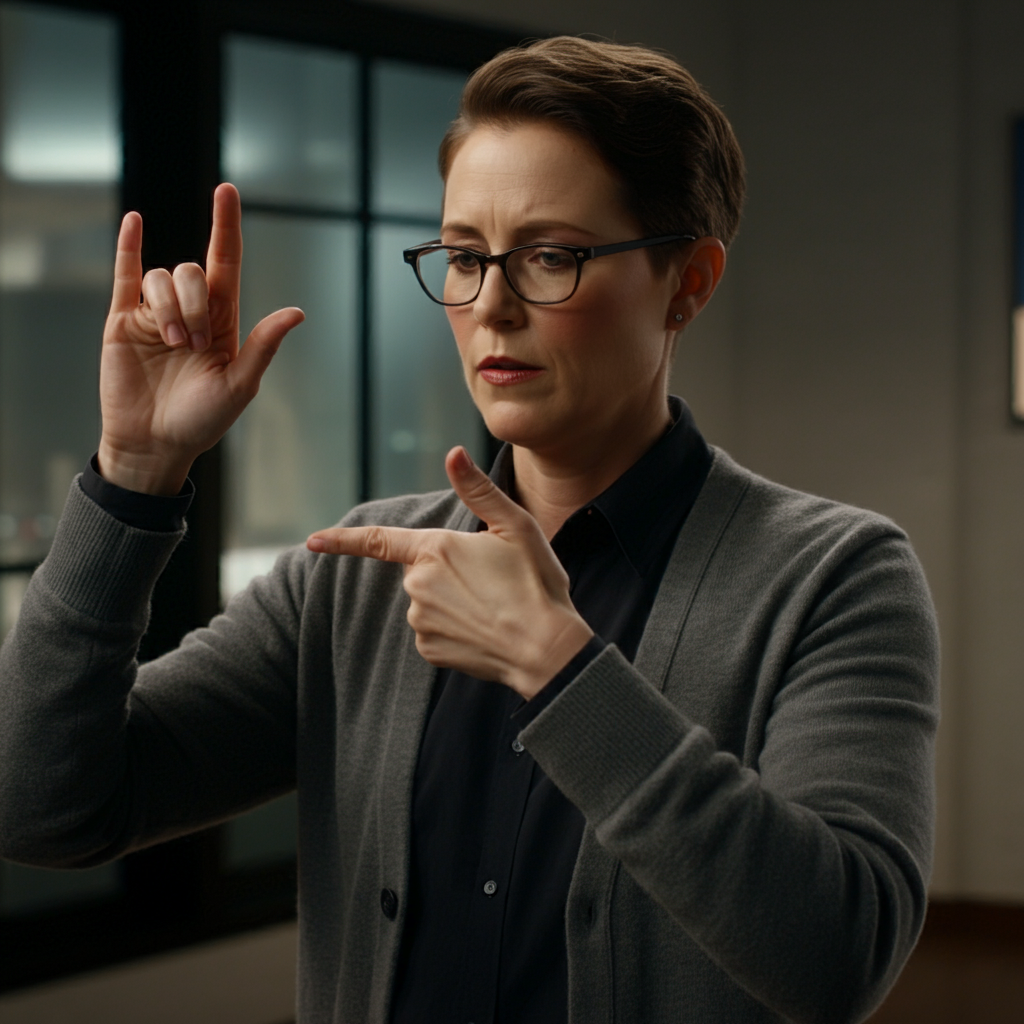
Sign Language Interpreting in Northern Virginia
Discover the Art of Connection with Gina Sentz. Benefit from expert ASL interpretation and compassionate support in Northern Virginia.
Explore Our Services
Discover expert ASL interpretation and Deaf translation services for efficient communication. Schedule, consult, and connect with confidence. Professional support available.

ASL Consultation

Business Interpretation

Medical Interpretation

Community Events

Medical Interpretation

ASL Consultation

Community Events

Business Interpretation
Experience Exceptional ASL Services in Northern Virginia
Welcome to Gina Sentz, your trusted partner for superior ASL interpretation and Deaf translation services in Northern Virginia. With years of experience, we are dedicated to empowering communication by providing personalized and comprehensive ASL services. We believe that everyone deserves clear and inclusive communication for their well-being.
Our Expert ASL Interpretation Services
Discover professional ASL interpretation and Deaf translation services with Gina Sentz. Connect effectively through expert communication.
Comprehensive Communication Support
Our services ensure accurate communication, providing tailored solutions for diverse situations.
Professional ASL Interpretation
Experience seamless communication with professional ASL interpretation, personalized for your unique needs.
Deaf Translation Expertise
At Gina Sentz, we provide expert Deaf translation services, ensuring clarity and understanding.

Sign language interpreting is indispensable for ensuring equal communication access for Deaf and Hard of Hearing individuals, especially in bustling areas like Northern Virginia. With its proximity to Washington, D.C., thriving business environment, diverse population, and wealth of educational opportunities, Northern Virginia has become a hub for both interpreters and members of the Deaf community. Whether someone is scheduling a medical appointment, attending a government hearing, or participating in a corporate meeting, the availability of highly skilled sign language interpreters can make a world of difference. Below, we explore the pivotal role of sign language interpreting near Northern Virginia, detailing the importance of professional services, the key local resources, and the broader legislative context that shapes and protects the rights of Deaf and Hard of Hearing residents.
Understanding Sign Language Interpreting
Sign language interpreting involves transforming spoken language into a visual-manual language, most commonly American Sign Language (ASL), and vice versa. Interpreters act as communication bridges, ensuring that Deaf and Hard of Hearing individuals can engage fully with people and institutions that communicate primarily through speech.
The Role of American Sign Language (ASL)
American Sign Language (ASL) is a complete, natural language with its own grammar and syntax. Although ASL is the most widely used sign language in the United States, it differs substantially from English in structure and expression. Additionally, many Deaf individuals employ variations such as Pidgin Signed English (PSE) or Signing Exact English (SEE). Because of these distinctions, sign language interpreters must possess strong linguistic competence and the flexibility to adapt to each Deaf individual’s preferred mode of communication.
The Deaf Community and Its Cultural Implications
Deaf and Hard of Hearing individuals share a rich cultural identity that places high value on visual communication and shared experiences. In Northern Virginia and the larger Washington, D.C. region, the Deaf community is particularly vibrant, influenced in part by the presence of Gallaudet University in the District of Columbia. This cultural hub draws Deaf professionals, academics, and advocates who fuel the growth of resources and community events. From Deaf social gatherings to educational seminars, these activities foster strong connections among residents.
Understanding Deaf culture is crucial for interpreters and service providers alike. A culturally aware interpreter does more than simply convert words; they accurately convey tone, intent, and cultural nuances that maintain the integrity of communication. Such sensitivity is vital in delivering respectful and effective services that reflect the Deaf community’s values.
The Importance of Professional Interpreters
For many Deaf and Hard of Hearing individuals, clear and effective communication is both a personal right and a legal entitlement. While ad hoc methods (like asking a family member to interpret) may be tempting, only qualified professionals can ensure accurate and unbiased interpretation.
Ethical Considerations and Professional Guidelines
Professional sign language interpreters adhere to industry-recognized codes of conduct, including the Registry of Interpreters for the Deaf (RID) Code of Professional Conduct. These guidelines underscore key principles:
- Confidentiality: Interpreters must safeguard all private information shared during an assignment.
- Accuracy: They provide faithful interpretations without altering the meaning or intent of the speaker.
- Impartiality: A professional interpreter does not interject personal opinions or biases.
- Professional Development: Continuous learning helps interpreters maintain up-to-date knowledge of best practices and industry standards.
With a trusted professional, Deaf and Hard of Hearing individuals can communicate with confidence, secure in the knowledge that ethical standards are being upheld.
Impact of Interpreters on Accessibility
Skilled interpreters serve as the bedrock of equal access across a variety of settings:
- Healthcare: Effective communication about symptoms, treatments, and follow-up plans is crucial in medical environments. An interpreter’s presence can ensure that Deaf patients receive the same quality of care as hearing patients.
- Education: Interpreters facilitate classroom discussions, lectures, and extracurricular activities. Their services allow Deaf students to engage fully in academic life, from elementary school through college.
- Legal and Government: Court hearings, legal consultations, and government meetings require clear, unambiguous information exchange. A certified interpreter ensures that Deaf individuals understand their legal rights and responsibilities.
- Community and Social Events: Festivals, community forums, and religious services often attract diverse audiences. Providing interpreters fosters inclusivity by enabling Deaf attendees to participate meaningfully.
- Employment and Business: Workplace trainings, staff meetings, and professional conferences require effective communication for all employees. Interpreters remove communication barriers, making professional environments more equitable.
Sign Language Interpreting Options in Northern Virginia
Given Northern Virginia’s extensive commercial and governmental landscape, the region boasts numerous avenues for securing sign language interpreting services. This includes professional interpreting agencies, nonprofit organizations, and a broader network of resources dedicated to Deaf community support.
Local Interpreting Agencies
Several reputable agencies operate in and around Northern Virginia, offering qualified interpreters who specialize in medical, legal, educational, and business settings. Agencies often manage scheduling, billing, and logistics, streamlining the process for clients.
- Advantages of Agencies:
- Access to a pool of interpreters with varied expertise
- Quick service turnaround for urgent needs
- Rigorous vetting procedures for certification and background checks
Some agencies also offer Video Remote Interpreting (VRI), which enables Deaf and Hard of Hearing individuals to connect with interpreters via video call. VRI can be a practical solution in locations where on-site interpreters are unavailable or when urgent, short-notice requests arise.
Community-Focused Nonprofits
Nonprofit organizations play a vital role in supporting Deaf and Hard of Hearing residents. While some nonprofits do not directly provide interpreting services, they frequently act as liaisons between the community and available resources. Examples include:
- Northern Virginia Resource Center for Deaf and Hard of Hearing Persons (NVRC): NVRC often hosts events, workshops, and advocacy programs, and can serve as a conduit to additional local services.
- Virginia Department for the Deaf and Hard of Hearing (VDDHH): This state agency offers information on interpreter referral services, technologies, and various Deaf-access resources.
Community-focused nonprofits are also instrumental in hosting Deaf awareness events and training sessions for businesses and community members, thereby fostering an inclusive atmosphere and broadening the general public’s understanding of Deaf culture.
Educational Institutions and Training Programs
Although not discussing the pathway of becoming an interpreter, it’s noteworthy that Northern Virginia’s proximity to Gallaudet University enriches the local environment. Gallaudet’s reputation as an international center for Deaf education brings a high concentration of Deaf professionals and sign language experts to the greater Washington, D.C. area. Nearby colleges also incorporate aspects of Deaf culture and sign language in their curricula. These educational institutions ultimately enhance the overall ecosystem of Deaf services and cultural awareness within Northern Virginia.
Finding and Hiring Sign Language Interpreters
Whether for an upcoming conference, a medical visit, or a legal consultation, connecting with a professional interpreter often involves a few strategic steps.
What to Look for in a Qualified Interpreter
- Certification and Credentials: Professional interpreters often hold certification from RID or meet state-level requirements. This ensures they follow ethical standards and demonstrate a proven level of competence.
- Relevant Expertise: Different settings—such as courtroom proceedings, corporate trainings, and mental health therapy—demand specialized vocabulary and protocols. Seek interpreters who have experience in your specific domain.
- Cultural Competence: An in-depth understanding of Deaf culture helps create a respectful environment and more effective communication.
- Professional Demeanor: Look for interpreters who arrive on time, maintain neutrality, and can handle sensitive information with discretion.
- References and Reviews: Request feedback from previous clients or check testimonials. Positive referrals often indicate reliable, high-quality service.
Budgeting for Interpreter Services
The cost of hiring interpreters can vary based on:
- Type of Assignment: Medical, legal, and advanced technical settings might require interpreters with specialized certifications, which can increase hourly rates.
- Length of Engagement: Assignments longer than a couple of hours may require multiple interpreters to rotate, due to the physically and mentally demanding nature of continuous interpretation.
- Travel and Logistics: Travel time, mileage, parking, and last-minute scheduling can all affect final costs.
- Technology Needs: If opting for Video Remote Interpreting (VRI), the setup might involve equipment fees or subscription costs.
Under the Americans with Disabilities Act (ADA), many public entities and private businesses are legally required to provide sign language interpreting services at no additional cost to the Deaf individual. Planning for these expenses in the organization’s budget not only ensures legal compliance but also boosts the entity’s reputation for inclusivity.
Challenges and Solutions in the Interpreting Field
Northern Virginia’s rapid population growth and cultural diversity present unique challenges in sign language interpreting. Nonetheless, local agencies and community advocates have pioneered strategies to meet these demands head-on.
High Demand and Short Supply
Healthcare facilities, courts, and public schools often face high demand for ASL interpreters. Finding professionals on short notice can be difficult—particularly those with specialized skill sets. To address the shortage:
- Agency Networks: Interpreting agencies pool resources so that when one interpreter is unavailable, others can fill the gap.
- Video Remote Interpreting (VRI): Deploying VRI helps close the gap between supply and demand, offering immediate service in urgent scenarios.
- Cross-Agency Collaboration: Local government offices sometimes share interpreter resources or coordinate scheduling to maximize coverage.
Deaf Consumer Feedback
Quality assurance is paramount in sign language interpreting. Deaf and Hard of Hearing individuals are in the best position to evaluate whether an interpretation was accurate and culturally sensitive. Collecting their feedback can be as simple as distributing short surveys or facilitating discussions with community leaders. This input allows agencies and hiring parties to:
- Identify Strengths: Learn what interpreters are doing well, such as maintaining clarity or pacing.
- Pinpoint Areas for Improvement: Determine if certain events require more tailored preparation or if interpreters need deeper technical training.
- Develop Long-Term Relationships: Satisfied Deaf and Hard of Hearing clients often remain loyal, creating a stronger and more sustainable network of service providers.
Legislation and Rights in Northern Virginia
Providing sign language interpreters is not solely an act of goodwill; in many cases, it is a legal requirement. Several legal frameworks reinforce the rights of Deaf and Hard of Hearing individuals to receive accessible communication services.
The ADA and Its Role
The Americans with Disabilities Act (ADA) is a cornerstone of disability rights in the United States. It outlines requirements that apply to state and local government services (Title II) and to many private entities that qualify as “public accommodations” (Title III). Under the ADA:
- Effective Communication Obligation: Businesses and government bodies must ensure that Deaf and Hard of Hearing patrons receive information equal in clarity to what hearing patrons receive.
- Auxiliary Aids and Services: ASL interpreters often fall under the umbrella of “auxiliary aids,” which can also include captioning or assistive listening devices.
- No Additional Charges: Deaf individuals cannot be charged extra for an interpreter or other access accommodations.
Local Regulations and Initiatives
Northern Virginia falls under the Commonwealth of Virginia, where the Virginia Department for the Deaf and Hard of Hearing (VDDHH) amplifies ADA requirements through state-level guidance and resources. Additionally, county governments within Northern Virginia—such as Fairfax, Arlington, and Loudoun—often have policies that promote or even expand upon federal and state mandates. These can include:
- Accessibility Offices: Local governments may have dedicated offices that oversee ADA compliance and coordinate interpreting requests.
- Accommodation Funds: Some jurisdictions set aside budgets to cover the cost of interpreters for public events, town hall meetings, and community programs.
- Awareness Campaigns: Periodic workshops or public seminars raise awareness about Deaf culture and the importance of accessible communication, encouraging businesses to adopt best practices voluntarily.
The Future of Sign Language Interpreting
Changing technologies and broader social awareness continue to shape the future of sign language interpreting in Northern Virginia. From instant online scheduling tools to advanced video platforms, the landscape evolves rapidly.
Technological Advancements
- Video Remote Interpreting (VRI): Already used in hospitals, courts, and corporate settings, VRI reduces response times and can lower costs. For it to be effective, high-quality internet connectivity and equipment must be in place.
- Remote Collaboration Platforms: Interpreters increasingly leverage video conferencing tools to serve clients in real time, even if they are physically located miles apart.
- Speech-to-Text Integration: While not a substitute for an interpreter, improved speech-to-text software can supplement Deaf access in large events or personal settings, especially when combined with skilled sign language interpretation.
Expanding Opportunities
- Corporate Inclusivity: Companies across Northern Virginia recognize the benefits of diverse and inclusive work environments. As a result, more businesses are integrating sign language interpreting into their corporate events and training sessions.
- Hybrid Events: The rise of virtual and hybrid events opens new doors for interpreters to reach audiences worldwide. Conferences, webinars, and streamed events can incorporate sign language interpreting to ensure Deaf participants receive equally engaging experiences.
- Increasing Demand for Specialized Skills: Fields like high-tech, healthcare, and finance have niche terminologies. Northern Virginia’s concentration of government contractors, IT companies, and research institutions sparks growing demand for interpreters who are conversant with industry-specific terminology.
Additional Considerations for Businesses and Organizations
Offering sign language interpreting services benefits not only Deaf and Hard of Hearing participants but also the broader community, as it signals inclusivity and social responsibility. By proactively planning for these services, organizations can avoid common pitfalls and foster lasting relationships with Deaf patrons, customers, or employees.
Planning for Accessibility in Events
- Advance Booking: Book interpreters as early as possible to secure availability. Provide interpreters with any scripts, technical outlines, or presentation materials in advance, allowing them to prepare for specialized jargon or topics.
- Venue Layout: Ensure the event space is designed for optimal visibility. Deaf attendees should have a clear line of sight to both the speaker and the interpreter. Good lighting and minimal visual distractions help maintain focus on the interpreter’s signs.
- Event Promotion: If you are hosting an event where interpreting is provided, announce this service in your promotional materials. Deaf community members are more likely to attend when they know their communication needs will be met.
Building Relationships with Interpreting Professionals
- Contract or Service Agreement: For recurring needs—such as regular staff meetings or monthly workshops—consider establishing a contractual relationship with a local interpreting agency. This arrangement often yields smoother scheduling and cost-effective packages.
- Invite Feedback: Encourage Deaf participants and interpreters to share their thoughts on how well communication went. This collaborative approach reveals best practices and areas for improvement.
- Stay Current with Technology: Keep up to date on VRI platforms, scheduling apps, and emerging communication tools. Adopting the latest innovations can streamline operations and expand accessibility.
Community Engagement and Volunteer Opportunities
Beyond formal interpreting assignments, Northern Virginia’s Deaf community thrives on social events, workshops, and volunteer-driven initiatives. These activities enable Deaf and hearing individuals alike to bond over shared interests and cultivate mutual respect.
Deaf Socials and Meetups
Local organizations and grassroots groups frequently host “silent dinners” or conversation meetups at restaurants, coffee shops, and community centers. These gatherings allow Deaf individuals, families, and friends to interact casually. Some meetups welcome ASL learners seeking to practice, while others focus on community building and cultural exchange.
Nonprofit Volunteering
Community-focused nonprofits often seek volunteers to assist with outreach programs, event coordination, or fundraising. Though volunteering is not about providing interpreting services without pay, it can be a fulfilling way for members of the community—hearing or Deaf—to lend support, share perspectives, and strengthen advocacy efforts for Deaf accessibility.
Workshops and Seminars
From cultural awareness seminars to ASL vocabulary workshops, Northern Virginia hosts events designed to educate the broader public on Deaf culture and communication. These programs might cover topics such as:
- Inclusive Customer Service: Best practices for greeting, assisting, and interacting with Deaf clients.
- Emergency Preparedness: Communication strategies for Deaf residents during regional emergencies or natural disasters.
- Deaf Culture Appreciation: Presentations on Deaf history, literature, and famous figures who have shaped the community.
By participating in these workshops, organizations, families, and community leaders can foster an environment that values Deaf perspectives and eliminates barriers.
Real-World Impact of Sign Language Interpreting
The ripple effect of quality interpreting services extends across all aspects of daily life:
- Medical Settings: When interpreters accurately convey patient histories and doctors’ instructions, patients are more likely to follow treatment plans and make informed decisions. Misdiagnoses or medical errors become less likely, improving overall health outcomes.
- Education: Deaf and Hard of Hearing students who receive interpreting services develop stronger academic performance, self-confidence, and social inclusion. They can participate in group discussions, activities, and extracurricular opportunities on an equal footing with hearing peers.
- Legal Proceedings: In any legal context—such as family court, traffic court, or criminal hearings—the presence of an interpreter helps guarantee that Deaf individuals can protect their rights and clearly articulate their statements.
- Professional Advancement: Interpreters empower Deaf professionals to thrive in workplace trainings, strategy meetings, and conferences, opening doors for career growth and leadership roles.
- Community Events: From local festivals to faith-based gatherings, interpreters promote seamless community engagement. Deaf attendees can fully enjoy the presentation, performance, or conversation at hand.
Conclusion
Sign language interpreting near Northern Virginia stands as a linchpin of accessibility, cultural inclusion, and legal compliance. Through the expertise of highly qualified interpreters, Deaf and Hard of Hearing residents gain the opportunity to participate fully in medical, educational, legal, professional, and social arenas. Local interpreting agencies and nonprofits collaborate to expand service availability, while the ADA and other regulations anchor accessibility as a fundamental right.
As technology evolves, the region continues to see innovations like Video Remote Interpreting that address pressing shortages and specialized demands. At the same time, feedback from the Deaf community drives improvements in interpreter quality and cultural relevance. This synergy of professional standards, advocacy, and community engagement ensures that Northern Virginia remains a model for inclusive communication.
Ultimately, sign language interpreting is more than a transaction; it is a powerful equalizer. Each interpreted conversation or event underscores the message that every voice counts—and that every person, regardless of hearing status, deserves the chance to interact, learn, and thrive. By embracing qualified interpreters and investing in these crucial services, businesses, organizations, and public institutions across Northern Virginia affirm their commitment to a more inclusive, vibrant community.
Gina Sentz has enriched my life with her expertise and compassionate interpretation.
Michael Johnson
Community Organizer

I’m thankful to Gina Sentz for her tailored services and cultural understanding.

Lisa Thompson
Healthcare Professional
With Gina Sentz, I now engage in events and interactions with confidence.

Brian Williams
Educator
Choosing Gina Sentz was the best choice for effective and inclusive communication.

Sophia Carter
Entrepreneur
What is ASL interpretation?
An ASL interpretation ensures accurate communication and understanding.
How do I know if I need an interpreter?
If communication barriers exist, consider an interpreter. Get advice for personalized support.
What is Deaf translation and its benefits?
Deaf translation bridges communication gaps. Gina offers expert services.
Empower Communication with Gina Sentz
Manassas, VA 20110
(703) 565-7777
ginasentz@gmail.com
